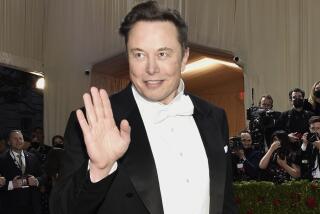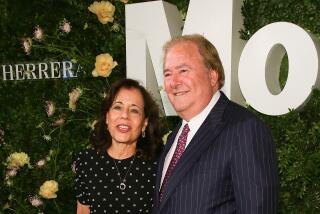Ranking of Richest Angelenos Changes With Stock Market
- Share via
Easy come, easy go.
One year ago, Gary Winnick was riding high. The telecommunications entrepreneur topped the rankings of the richest people in Los Angeles with a net worth estimated at $6.2 billion--more than David Geffen, Steven Spielberg and Jeffrey Katzenberg combined. He owned a four-acre estate in Bel-Air and had every reason to believe that his charmed life could only get better.
One year later, Winnick is--well, to tell the truth, he’s still doing pretty well. He’s still got his company, Global Crossing Ltd., which is building an international fiber optics network. He’s still got the Bel-Air estate--in fact, he just purchased the place next door for $10 million so he could tear it down and give himself a little breathing room. And he just gave away $40 million to build a peace and tolerance institute in Jerusalem.
That said, all is not perfect in Winnick’s world. The perils of the Nasdaq market cost him about $2.4 billion in the past year and he no longer can claim to be the richest Angeleno.
That distinction, the Los Angeles Business Journal reported Monday, has reverted to Eli Broad, who followed a more traditional path to riches in Southern California--he built houses, parlayed that into financial services and has become a venture capitalist.
According to the Business Journal, Broad’s net worth rose 28% in the past year to $5.5 billion, easily enough to top the newspaper’s Top 50 list. He was followed by oilman Marvin Davis at $4.9 billion, Winnick at $3.8 billion and DreamWorks co-founder David Geffen at $2.8 billion.
The list suggests that the Los Angeles economy is a fairly dynamic mix of the old and new. Hollywood, which itself is a mix of high- and low-tech, is the biggest single presence among the city’s multimillionaires and billionaires, but still only accounts for about one-quarter of the total.
Others made money through a wide variety of means, including aircraft leasing, real estate, supermarkets, mail-order merchandising, financial management, software, cosmetics, insurance, restaurants and hotels. Still others simply inherited their fortunes.
“It’s a really good time to be filthy rich in America,” said David Friedman, a Markle senior fellow at the New America Foundation who studies the economy and development. The Los Angeles economy may be more diversified than that of some cities, he said, but it’s also deeply divided between rich and poor.
Friedman has not shed a single tear for Winnick--nor, he guesses, has Winnick himself. (Winnick did not return a call from The Times seeking comment.)
“In a sense,” Friedman said, “he didn’t even have time to get used to being a six-billionaire, and now he’s plenty content to be a four-billionaire. . . . Folks like that--the Nasdaq crowd--seem to have accepted the fact that they’re looking at one of the real big collapses of wealth in American history and really don’t care. Because there was an even bigger run-up immediately prior to it.”
Nor should Winnick wait for a condolence call from Broad.
“I think Gary’s doing fine,” the chairman of Sun-America Inc. said. He took exception to the idea that Winnick had “lost” $2 billion.
“I wouldn’t say ‘lost it,’ ” he said. Rather, one could say, “his net worth went down.”
More to Read
Inside the business of entertainment
The Wide Shot brings you news, analysis and insights on everything from streaming wars to production — and what it all means for the future.
You may occasionally receive promotional content from the Los Angeles Times.










